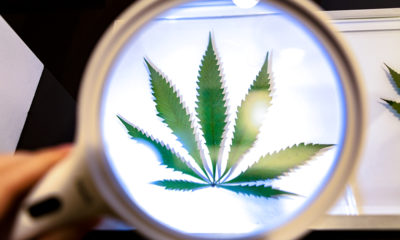
Medical
In Illinois, Marijuana Is an Official Painkiller
Massive expansion, easing of restrictions in Illinois’s medical marijuana law under bill signed by Gov. Bruce Rauner.
Every Illinois resident with a prescription for an opiate-based prescription painkiller is now eligible to access medical marijuana, under new legislation signed into law by Gov. Bruce Rauner on Tuesday that vastly expands that state’s medical cannabis program.
Medical marijuana has been legal since the Illinois General Assembly approved a “pilot program” in 2013, and retail sales in dispensaries began in November 2015. However, as with some of the other more recent states to allow sick people to access cannabis, Illinois’s cannabis law has been criticized as too restrictive.
Up until now, doctors could recommend cannabis for only 40 specific conditions. Terminal illnesses and PTSD were late additions, but through the end of July 2018, only 42,203 patients — out of a statewide population of 12.8 million — have been entered into the state medical-marijuana program. Compare that to the 2.3 million people who filled more than 5 million opiate prescriptions, and it is easy to see the potential.
As The Chicago Tribune reported, the bill allowing prescription painkiller users the option to use cannabis is at least partially a response to the opiate-overdose epidemic. Drug overdoses killed 72,000 Americans in 2017, according to the Centers for Disease Control and Prevention, including 2,000 Illinois residents.
States where cannabis is readily available in some form have seen far fewer opiate-overdose related fatalities than states where the drug is prohibited. And marijuana’s power as a painkiller has been recognized by the National Academy of Sciences, which conducted a thorough review of available medical and scientific literature on cannabis’s palliative power.
Marijuana access reduces both opiate prescriptions and overdose-related deaths, multiple studies have revealed — a fact that Rauner openly acknowledged.
“We are creating an alternative to opioid addiction,” he said Tuesday, as per the Tribune. “It’s clear that medical marijuana treats pain effectively, and is less addictive and disruptive than opioids.”
In addition to allowing doctors who prescribe pills like Vicodin and Percocet to also enter patients into the state medical-marijuana program, other restrictions on Illinois’s medical cannabis law were also lifted.
Patients can now sign up online and get a temporary, immediate permission to buy medical cannabis while their permanent application is being reviewed. Restrictions that required patients to be fingerprinted and undergo a criminal background check have also been lifted.
These advances are significant, but Illinois appears poised to continue moving swiftly ahead with marijuana-policy reform — in part because of the issue’s emergence as a political winner in Rauner’s re-election campaign against self-funded billionaire JB Pritzker, who has been championing legalization since January.
Following the election in November, state lawmakers are poised to consider a fine-tuned (and politically vetted) legalization bill during the 2019 session. If passed, Illinois would become just the second state to legalize recreational marijuana in the state legislature as opposed to at the ballot, after Vermont passed such a law this year.
As in other states and nationwide, legalization is overwhelmingly popular in Illinois, where 66 percent of registered voters say they favor a law that ends criminal penalties and regulates marijuana sales in a fashion similar to alcohol.
However, some restrictions still apply. The new permissions for opiate users don’t go into effect until Dec. 1. And owing to a nationwide concern from law enforcement about the diversion of legal cannabis into the black market, patients will be limited in how much cannabis they can buy to a “90-day supply.”
Other lawmakers voiced fears about how cannabis edibles could appeal to children — an issue that has yet to arise in states with longstanding retail recreational marijuana access, where sharing cannabis with children carries criminal penalties.
TELL US, do you use cannabis to deal with chronic pain?
























